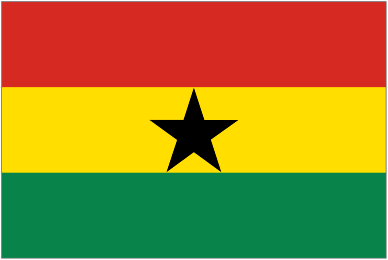This west African nation (population 24 million) is sandwiched between the Ivory Coast (to the west) and Togo (to the east). Next to the small nation of Togo is the small nation Benin, and to her east is Nigeria (population 158 million). Among the largest population centers are Accra, the capital (metropolitan area pop. 3 million est.), Kumasi (1 million est.), and Tema (500,000 est.). Ghana's terrain is primarily grasslands in the north, farmland and forest in the south. The climate is tropical.
Ghana is home to over 100 ethnic groups (Kwa, Gur, and Mande are three of the largest). Literacy is 70%. Since the early 1980s, Government of Ghana expenditures on education have risen from 1.5% to nearly 3.5% of GDP.
Natural resources include gold, oil, timber, cocoa, diamonds, bauxite, manganese, fish. A major oil discovery off the coast of Ghana in 2007, the Jubilee Field, began production of oil and gas in December 2010. Ghana's economy has been strengthened by a quarter century of relatively sound management and sustained reductions in poverty levels. Agriculture accounts for roughly one-quarter of GDP and employs more than half of the workforce. The services sector accounts for 50% of GDP. Annual per capita income is $600 (United Nations World Statistics 2010).
63.55% of Ghanaians claim to be Christian (Operation World). My third visit to this country takes place in July 2012. Please keep your brothers and sisters in Accra in your prayers. God bless you.
This article is copyrighted and is for private use and study only. © 2004. Reprints or public distribution is prohibited without the express consent of Douglas Jacoby.










